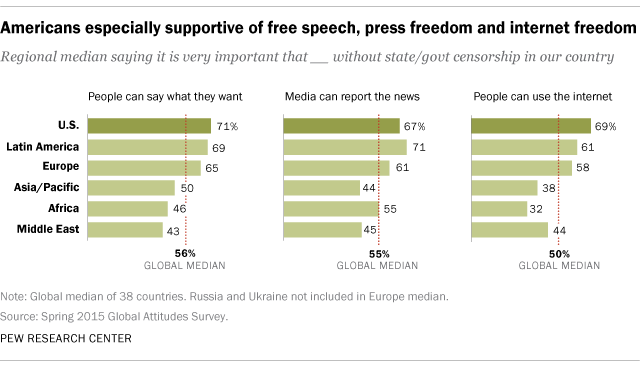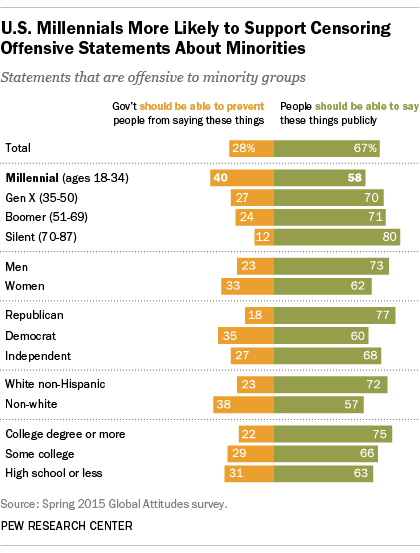State of the Debate: Who Really Supports Free Speech?
In “State of the Debate” I will cover news articles, statistics, and interesting stories that show the ways we talk about free speech and social justice today. By accurately characterizing how we talk about these issues and what we believe about them, I can expose the inconsistencies, unfounded assertions, fallacies, and lies that dominate the discussion around free speech and social justice. In doing this, I hope to show how the historical examples I cover in this blog can lead us to a new, better, and evidence-based discussion. So, what do Americans today actually think about free speech?
Let's start with big picture statistics.1 America is the most supportive country for free speech in the world. According to a Spring 2015 poll done by Pew Research,2 71% of Americans believe it is very important for people to be able to say what they want without government censorship. 67% believe it is very important that the media is able to report the news without censorship and 69% say the same for using the internet.
There are two very important takeaways here. First, Americans support free speech more than anyone else. Second, a large majority of Americans support free speech. Let's jump into specific issues and specific demographics.
In the same poll, Pew found that a majority of every demographic category – All genders, all races, all ethnicities, all ages, all levels of education, all political affiliation – support the freedom of speech to say things offensive to minorities in public.3 Only 28% of respondents overall agreed the government should be able to prevent people from saying these things, while 67% overall thought people should be able to say such things. Note, though, that the headline was meant to call attention to the generational divide. 40% of Millennials agreed the government should be able to prevent people from saying things offensive to minorities. However, 58% disagreed. You'll also note from the poll that support for this type of speech increased with exposure to higher education.
In a March 2018 poll conducted by Pew about censorship online, the generational divide is reversed. Older Americans are more likely than younger Americans to support efforts both by governments and by tech companies to favor restricting false information online, even if it limits freedom of information.4 The same poll once again found that higher education increased support for freedom of information. Democrats and Republicans both prefer tech companies to restrict false information on their platforms to government interference, with Democrats slightly more likely to support both. Women, too, are more likely than men to support actions taken by both the government and tech companies, but a majority of both men and women support actions by tech companies.
Pew released another relevant poll today based on data gathered in April and May.5 The poll asked respondents a series of questions about the state of American political discourse broadly. What is interesting for us are three questions. First, Pew asked if “heated” rhetoric by politicians raises the risk of violence. 91% of Democrats and 61% of Republicans agreed with this proposition; 78% overall. Second, majorities agreed that the American public does not agree on what constitutes sexist or racist language. Third, nearly everyone agrees that certain statements by politicians, such as deliberately misleading people about the opponent's record, is never or rarely acceptable.
Finally, I wanted to highlight a Knight Foundation report that found that 78% of college students wanted to exposed to all types of viewpoints, compared to only 22% that wanted colleges to limit biased or offensive speech.6 Indeed, this is higher than the percentage of U.S. adults overall who say this, which at only 66%. The whole study is worth reading, if you have the time.
So with these numbers we can defend the following conclusion. Broadly speaking, everyone supports free speech, but based on the specific issue, we sometimes disagree about where to draw the line. Millennials may be more inclined to support restrictions on offensive speech against minorities than older folks, while the reverse is true when it comes to censorship on the internet. Democrats, women, and minorities tend to be slightly more supportive of action to address false information online and on offensive comments directed at minorities. More educated people are more likely to support free speech than less educated people.
So what can be said for headlines like the following by Aaron Colen – “New study shows why college students can't handle free speech” – which one sees over and over again?7
Contrary to the way the Blaze article is set up, which is by referencing protests against Ben Shapiro speaking, the Brookings Institute study did not find that Democrats or liberals or leftists or what have you uniquely oppose free speech. In fact, it found that self-identified Republicans were more likely to support violence to prevent a speaker from speaking (22%) than Democrats (20%). This statistic in particular caused a stir,8 with the study's author saying, “the fraction of students who view the use of violence as acceptable is extremely high. While percentages in the high teens and 20s are “low” relative to what they could be, it’s important to remember that this question is asking about the acceptability of committing violence in order to silence speech. Any number significantly above zero is concerning. The gender difference in the responses is also notable.”9 I am not concerned by this number because I have zero context for it. What percentage of Americans, in general, believe that such violence is acceptable? You may recall that Greg Gianforte, a Republican from Montana, became a Congressman after bodyslamming a journalist. After that incident, Public Policy Polling (PPP), a well-known liberal pollster, asked “Do you think it is appropriate or inappropriate for Republican politicians to body slam members of the media?” and 22% of respondents agreed with that statement.10 Moreover, the Brookings poll did not ask non-college respondents, and we have good reason, based on the polling I showed you above, to believe college students are more not lesssupportive of free speech than the rest of America. So, if we are concerned about non-zero support for violence, it makes no sense to talk about college students in isolation. Finally, what exactly does violence mean in this case? The Washington Post opinion piece which mentioned the Brookings report, highlighted another poll which found that 81% of respondents believed words can be a form of violence.11 Grant this, and it is entirely unclear what the 20 or so percent of students mean when they agree that the use of violence is acceptable. After all, 78% of Americans think heated political rhetoric can at least lead to violence That same opinion piece highlighted another study suggesting only 1% of students would actually personally use violence to shut down a speaker they disagreed with.
Headlines like, “New study shows why college students can't handle free speech” create a false impression. They imply that college students do not support free speech. That is false. They imply that college students are ready to take up arms against unpleasant speakers. This is, at best, highly misleading based on the preponderance of evidence. They imply that, to the extent that a minority of college students do not support free speech, the position of those students is unique relative to other demographic groups. That is false – generally speaking, college students are more supportive of free speech than other groups. What statistics do show is that, broadly speaking, everyone supports free speech, we just disagree on exactly where to draw the line.
- 1. For high-quality polling around free speech, including polling I do not discuss here, check out Pew Research Center .
- 2. You can read the poll here
- 3. You can read the poll here.
- 4. You can read the poll here. For some reason, Pew did not provide a link specifically to this image.
- 5. You can read the poll here.
- 6. You can read the entire study here.
- 7. You can be the first person to read the Blaze in several years here. Headlines like this are plentiful, I am just picking on this one because it showed up first in my search.
- 8. The Washington Post, for instance, was greatly concerned about it.
- 9. You can read his study here.
- 10. You can read the full poll here. This is the real problem with Volokh's statement in his WaPo article that: "First, in my view it belies logic to assert, as some do, that all is well with respect to freedom of expression on campus, and that any suggestion to the contrary is an attempt to manufacture a concern where none exists. In light of the data above and the growing list of examples in which on-campus audiences were denied the opportunity to hear from invited speakers, it is certainly reasonable to debate the extent of the problem, but I don’t believe it is reasonable to deny the existence of the problem." The extent of the problem is unrelated to college campuses. If there is a problem, then it is nationwide and focusing just on college campuses and college students is "manufacturing a concern where none exists." How much outrage will he have over Candace Owen arguing - also against the Supreme Court's jurisprudence - that flag burning should be punished?
- 11. A finding which provoked its own hand-wringing, but I do not think it is inherently obvious that words can never be violent. The question only asked if they can be violent, and that is true or not depending on how you define violence. Does it have to be physical? Some definitions in the dictionary say yes, some imply no. That is, at least, a completely valid conversation to have.

